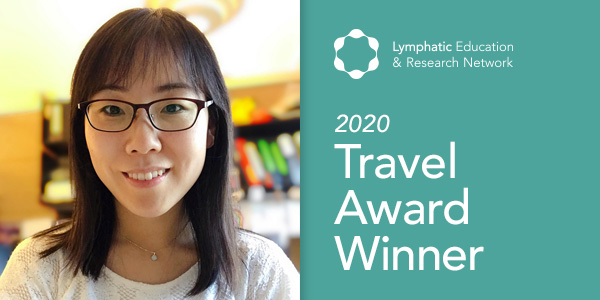Wenjing Xu, Ph.D., currently a postdoc at the University of North Carolina at Chapel Hill, under the supervision of Kathleen Caron, Ph.D., received a Travel Award from LE&RN to attend the 2020 Lymphatics Gordon Research Conference. We asked Wenjing to share her thoughts on that experience with us and to tell us a bit about her research and future plans.
What did you get out of the conference? Why did you feel it was important to attend?
This is my second time attending the Gordon Research Conference on Lymphatics. I have been doing research in the lymphatic field for almost 5 years since I joined Dr. Kathleen Caron’s group. In this particular conference, I was able to present my work both by talk and poster presentation. I received valuable comments from excellent scientists from the lymphatic field. I also had this great opportunity to hear wonderful talks and communicate with other people which broadened my sight and provided me many amazing ideas. All of this cannot be gained by just doing experiments in a lab. More importantly, networking with other scientists is very beneficial to a young scientist for his/her career development.
What are your areas of interest in research?
I am very interested in cardiovascular biology and how my research could help people with cardiovascular diseases. My current research focuses on inter-individual differences of lymphatics using a panel of genetically diverse mouse strains. This research will help us uncover the novel genetic factors that regulate the growth and development of lymphatics in the hope to eventually discover genetic targets that may help manipulate the growth and function of lymphatics in patients with lymphatic disorders.
What are your hopes and plans for your career and your research?
Basic medical research is fundamental to the clinical treatment of patients. As a senior postdoc, I am exploring my own research interest and hope to further contribute to the lymphatic field. Eventually, I hope my research will help clinicians treat patients with lymphatic diseases.
Why do you believe that, in general, lymphatic research is important? What might the field accomplish within the next few years?
Although lymphatics have been neglected before, more and more exciting research has drawn people’s attention to the fact that lymphatics have their own unique biology and function and play an indispensable role in every tissue. Disruption of lymphatic development or lymphangiogenesis leads to serious consequences which is not only shown in basic research but also lets hundreds of millions of people suffer from it without any effective treatment. Lymphatics have become an important therapeutic target in various diseases such as lymphatic diseases, cancers, allergies, neurological disorders, etc. Lymphatic research is the tool revealing unknown aspects of our lymphatic systems in different tissues and diseases, the way helping alleviate the pain of patients, and the path leading to the cure for lymphatics diseases. Within the next few years, scientists will better understand lymphatic development and functions and develop new advanced methods to diagnose and treat lymphatic diseases. Lymphatics will also be used as a therapeutic target and drug delivery route for more and more diseases. LE&RN’s effort in advocating for lymphatic research will keep bringing in more and more attention to this previously neglected but very important field, which benefits many research fields associated tightly with lymphatic research.
LE&RN programs, like LE&RN Travel Awards, are only possible because of our Partners and Supporting Members. Become a Supporting Member today.

